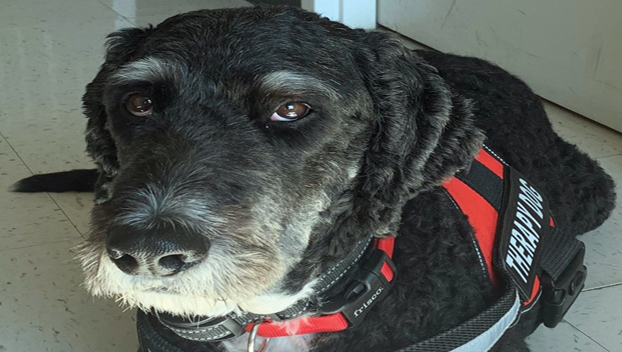Hospice of Stanly & the Uwharrie welcomes pet therapy dog back to work
Published 11:13 am Wednesday, August 11, 2021

- Theo is the therapy dog for Hospice of Stanly & the Uwharrie.
|
Getting your Trinity Audio player ready...
|
Hospice of Stanly & the Uwharrie announces it has brought pet therapy dog Theo back into the office. Theo had seen a few clients at their homes during the COVID-19 shutdown, but had not seen patients at the office in more than a year.
Theo is a 4-year-old Bernedoodle, a Bernese Mountain Dog and Standard Poodle hybrid breed. He belongs to Hospice Bereavement Coordinator Michaele Conners, MA, LCMHC.
“We chose this particular breed for the calm nature of the Bernese Mountain Dog and the intelligence of the Poodle. He was one of the calmest puppies in his litter and has proven to be an amazing and intuitive therapy dog and family pet,” said Conners.
Trending
Pet therapy, or animal-assisted therapy, is defined as a therapy where animals are used in goal-directed treatment sessions. Dogs have specifically been found to have an innate ability to sense a client’s emotional needs and act on them with unconditional regard.
“In bereavement therapy, a therapy dog has an amazing ability to put the client at ease during a very emotional and difficult situation,” Conners said.
Research from UCLA and Johns Hopkins University indicates that the simple act of petting animals can:
- Promote the release of serotonin, prolactin and oxytocin. These hormones can assist in elevating mood;
- Lower anxiety and help people relax;
- Provide comfort and can decrease inhibitions, allowing for an increase in communication;
- Increase metal stimulation;
- Provide a relaxing distraction in the therapy process;
- Lower blood pressure;
- Slow breathing through the release of endorphins; and
- Improve the processing of emotions in therapy sessions for some people.
Theo’s main purpose is to provide comfort during grief therapy. His presence alone is calming and provides stress relief during sessions. He works on instinct and seems to intuitively feel if a client wants him near. He responds to emotions and often approaches a client who is expressing emotions that are difficult.
“An example of one of Theo’s early therapy dog sessions was with a middle-aged man who had recently experienced a loss. The man became very emotional during the session. Theo calmly stood up, walked to the man, placed his head on the man’s knee and stood there for more than 15 minutes as the man continued crying and talking while petting Theo’s ears and head,” Conners said. “The man told me at the end of the session that having Theo present provided him with comfort and helped him process his feelings. That was when I truly knew that this dog has a strong instinct to be with those who are struggling in grief.”
Theo is available to all bereavement clients of Hospice of Stanly & the Uwharrie. He attends Camp Forget-Me-Not for grieving children and can be found at Hospice special events where therapy dogs are allowed.
Trending
For more information about bereavement services or to make a donation to Hospice of Stanly & the Uwharrie, visit hospiceofstanly.org or call 704-983-4216.





